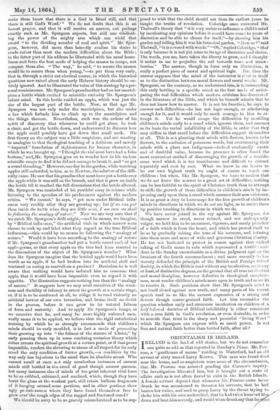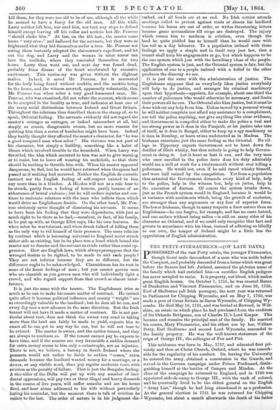ORIENTALISAI IN IRELAND.
IRELAND is the land of odd stories, but we do not remember one quite so odd as that reported in Monday's Times. Mr. Pen- rose, a " gentleman of means" residing in Waterford, had an ohl servant of sixty named Larry Keown. This man was found dead near the house, and so auspicious were some of the circumstances, that Mr. Penrose was arrested pending the Coroner's inquiry. The investigation liberated him, but it brought out a state of affairs such as is not often found to exist in the British Islands. A female servant deposed that whenever Mr. Penrose came home drunk he was accustomed to threaten his servants, that he had beaten her twice, and used to grasp Larry by the throat trying to choke him with his own neckerchief, that he had twice knocked hi down and beat him severely, and would when drunk say that be ist
kill them, for they were too old to be of use, although all the while he seemed to have a fancy for the old man. All this while Larry neither left him, nor sued him, nor took any steps to defend himself except leaving off his collar and necktie lest Mr. Penrose "should choke him." At last, on the 4th inst., the master came home "very cross" and hallooed for the servants, but they were so frightened that they hid themselves under a tree. Mr. Penrose not seeing them instantly adopted the slaveowner's expedient, and let out the dog, and Larry and the woman in utter terror ran into the coalhole, where they concealed themselves for two hours. Larry then went out, and next day was found dead, probably from disease of the heart accelerated by excessive excitement. This testimony was given without the slightest malice. Indeed, it saved Mr. Penrose, for it accounted for the body being found without necktie, and the necktie being in the house, and the witness asserted, apparently voluntarily, that Mr. Penrose was when sober a very good-humoured man. Mr. Penrose, who was examined, did not refute the account, which seems to be accepted in the locality as true, and indicates at least one of the many social distinctions between Ireland and Great Britain. Throughout the relations thus described there is the stamp of, so to • speak, Oriental feeling. The servants evidently did net regard the master's outrages as outrages, or indeed misconduct at all, but
• simply as events, disagreeable events, but no more reasons for quitting him than a series of headaches might have been. Indeed they hardly thought they affected the master's character, for "he was a good-tempered man when sober." His violence was not part of his character, but simply a liability, something like a habit of illness which involved trouble to the household. When Larry was throttled, the idea which occurred to him was not to give warning or to resist, but to leave off wearing his neckcloth, so that there should be nothing to throttle him with. When his master appeared slangerous, he fled, but he would have returned when the spasm had passed as if nothing had occurred. Neither the English democratic instinct nor the English feeling of self-respect existed in him any more than in a Hind«). A Hiudoo will not as a rule bear to be struck, partly from a feeling of honour, partly because of an abhorrence of brutal violence ; but he will endure injuries and con- tinue to maintain relations with the man who inflicts them which would drive an Englishman frantic. On the other hand, Mr. Pen- rose obviously never thought of dismissing his servants. It seems to have been his feeling that they were dependents, with just as much right to be there as he had,—members, in fact, of his family, to be put up with, as George Eliot says, like his own features. So when sober he was tolerant, and when drunk talked of killing them -as the only way to rid himself of their presence. The mere relation by contract which is becoming universal in England never struck either side as existing, but in its place was a bond which bound the master not to dismiss and the servant to evade rather than resist op- pression. How are English laws, which always presuppose that the wronged desires to be righted, to be made to suit such people? They are not inferior because they are so different, but the difference ought to be acknowledged. Clannishness has its root in some of the finest feelings of man ; but you cannot govern men who are clannish as you govern men who will individually fight a crowd, and who regard support from that crowd as almost inter- ference.
It is just the same with the tenure. The Englishman tries as much as he can to make his tenure matter of contract. He cannot quite effect it because political influence and county " weight" are so exceedingly valuable to the landlord ; but he does all he can, and every day sees a new advance in the same direction. But the Irish tenant will not have it made a matter of contract. He is not par- ticular about rent, does not think the owner very cruel in taking more than the land can fairly be made to yield, expects him to exact all he can get in any way he can, but he will not bear to be evicted. The master is owner, and the cottier tenant, and they are always to continue so. If the tenant cannot pay he expects to have time, and if the seasons are very favourable a sudden demand for extra money seems to him only a catastrophe, not an injustice. There is not, we believe, a barony in South Ireland where the peasants would not rather be liable to sudden "ceases," extra demands because the landlord wanted money for a marriage, or a dower, or any visible need, than pay regular moderate rents with eviction as the penalty of failure. That is just the Bengalee feeling.
A rice-tiller of the Delta will put up with any number of inci- dental oppressions, will pay two or three illegal and heavy demands in the course of five years, will suffer assaults and see his house N. fired, and hear abuse addressed to his wife without particularly
Ittn: his zemindar, but the moment there is talk of eviction he to the last. The order of nature is in his judgment dis-
turbed, and all bonds are at an end. No Irish cottier attends meetings called to protest against rents or shoots his landlord because his barns are out of order, or writes threatening letters because game accumulates till crops are destroyed. The injury which rouses him to madness is eviction, even though the land he quits yielded leas to himself than he would earn with less toil as a day labourer. To a population imbued with these feelings we apply a simple and in itself very just law, that a tenant shall keep his engagements or go, but which happens to be the one system which jars with the hereditary ideas of the people. The English system is just, and the Oriental system is fair, but the application of one to a people imbued with a belief in the other produces the disarray we see.
It is just the same with the administration of justice. The Englishman supposes that as everybody likes justice everybody will help to do justice, and arranges his criminal machinery upon that hypothesis—appoints, for example, about one-third the number of policemen Who would otherwise be necessary, and limits their powers all he can. The Oriental also likes justice, but it must be done without any help from him. Unless moved by a personal wrong he will neither complain nor afford any assistance to a complainant, nor tell the police anything, nor give anything like clear evidence, and Government is compslled either to make the police a real and too strong power as it does in the Punjaub, or let justice take care of itself, as it does in Bengal, either to keep up a spy machinery as it does in Bombay, or leave crime undetected as in Madras. The Irishman entertains just the same feeling as the Oriental. No vil- lage in Tipperary expects Government not to hunt down the distiller of illicit whisky, but then nobody is going to help Govern- ment in doing it. Let it hunt as best it can, and the very man who once enrolled in the police force does his duty admirably would see a still at work for a twelvemonth without ever telling a policeman. He would not, even if he sold taxed whisky himself, and were half ruined by the competition. Yet from a population thus actuated the Government demands every kind of help, help to the police, help in the witness box, help on juries, help in the execution of decrees. Of course the system breaks down, just as the French system would in England, because it would be at variance with sentiments which, being the growth of centuries, are stronger than any arguments or any fear of superior force. The lower Irishman, though in many respects a finer nature than an Englishman—he can forgive, for example, and has no caste hatred, and can endure without being sullen—is still on many sides of his character an Oriental, and if we could only recognize that fact and govern in accordance with his ideas, instead of adhering BO blindly to our own, the temper of Ireland might be a little less the opprobrium of English administration.































 Previous page
Previous page